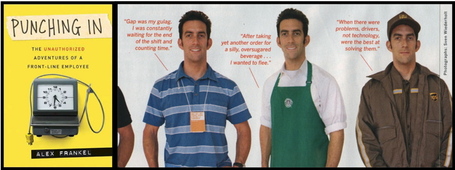
We continue our conversation with Alex Frankel, marketer and author of PUNCHING IN: The Unauthorized Adventures of a Front-Line Employee. (If you’re just joining us, read PART ONE here.)
johnmoore (jm): One of the more interesting observations you make from your front-line worker experience is about company uniforms. When talking about the iconic brown UPS uniform you write how the uniform had a “galvanizing effect on the workers” and that the UPS uniform was an “indicator of a special bond with the group.” You continue by saying, “More than once on the job, I ran into delivery people from FedEx and Airborne, and I was immediately struck by how unimpressive their uniforms were and what those companies were losing in terms of image.” Talk about the role a uniform plays in how it impacts a front-line employee’s demeanor and performance.
Alex Frankel (AF): Uniforms and dress codes are prevalent on the frontlines of commerce and can make the employees feel differently depending on what specific rules he or she must follow.
UPS is a great example of a uniform that I think works well. UPS drivers can rest assured that customers and members of the public think highly of them when they are in uniform. And they also have some latitude to be different than their colleagues. One driver might wear shorts, another pants. There are choices of jackets, vests, sweaters–and this allows people to express at least some individuality.
The UPS uniform also harks back to the old days, when customer service was more common. I interviewed one former UPS driver who delivered for years in the World Trade Center. He had never delivered in New York City, outside of those office towers. After 9/11 he was transferred to a new post delivering outside. He found it amazing to witness the attachment perfect strangers had for him based on his uniform.
On the flipside, strict dress codes can make employees feel alienated from their workplace. At Gap, for example, we were told to wear no jeans that had signature stitching of competitors. I for one had to leave my Levi’s at home and it felt constricting to have to suddenly conform.
Starbucks had a pretty loose policy—black/white/khaki and your green apron–though the hygiene restrictions (such as no visible tattoos) seemed too harsh.
jm: You tried to get hired on at The Container Store, but didn’t. What happened?
AF: That was one of the more interesting episodes of my project. I was immediately impressed when I applied at The Container Store because the application featured short answers instead of multiple choice questions. There was even an open-ended question that asked us to share anything we felt worth sharing.
I was invited in for a group interview, which was held right in the middle of a store. The ten of us assembled participated in what amounted to an audition, including an exercise in which we each picked a product from the store and held forth about what we thought about it. It was quite clear from that exercise alone just who had the necessary passion for the job. For my part, I did not shine. It was great to see a creative interview process firsthand, even if I didn’t make it to the next level.
jm: From your experience, what’s the most effective way interview process that results in hiring the best, most well-suited to task employees? Conversely, what’s the least effective way you experienced?
AF: That experience at The Container Store won, hands down, as the best way to interview applicants and isolate the most passionate prospects. The application was human and real and allowed people to express themselves and the interview process sorted the passionate applicants from those less committed to the cause. Very few companies ask much about an applicant’s interest in their product or service, though they should.
The least effective interview was also a group interview I went to at Gap. The exercises we did there had very little to do with the Gap; questions like "share with the group your favorite dessert." I dumbed down my own presentation and had an easy time landing a job.
read PART ONE | read PART THREE